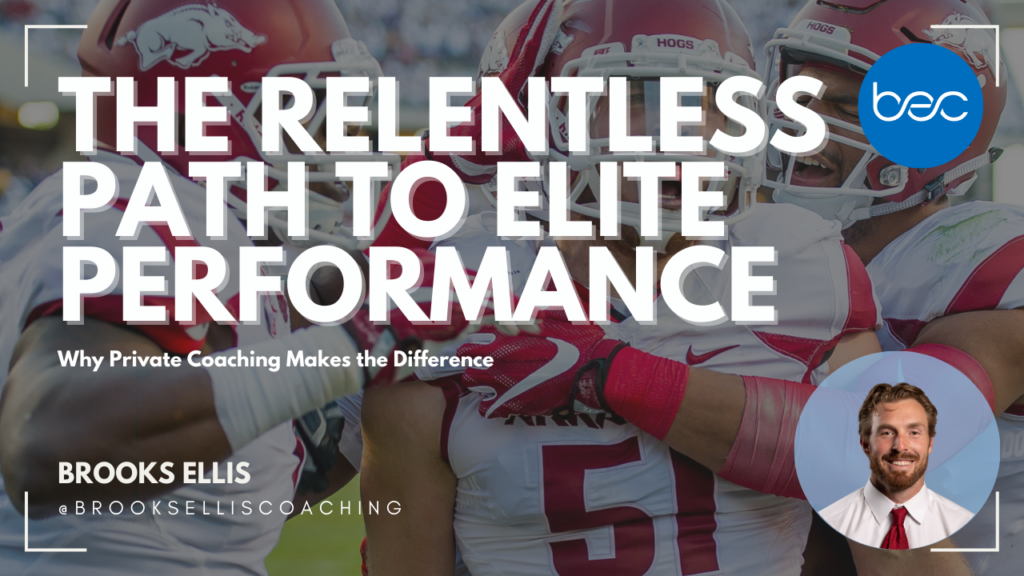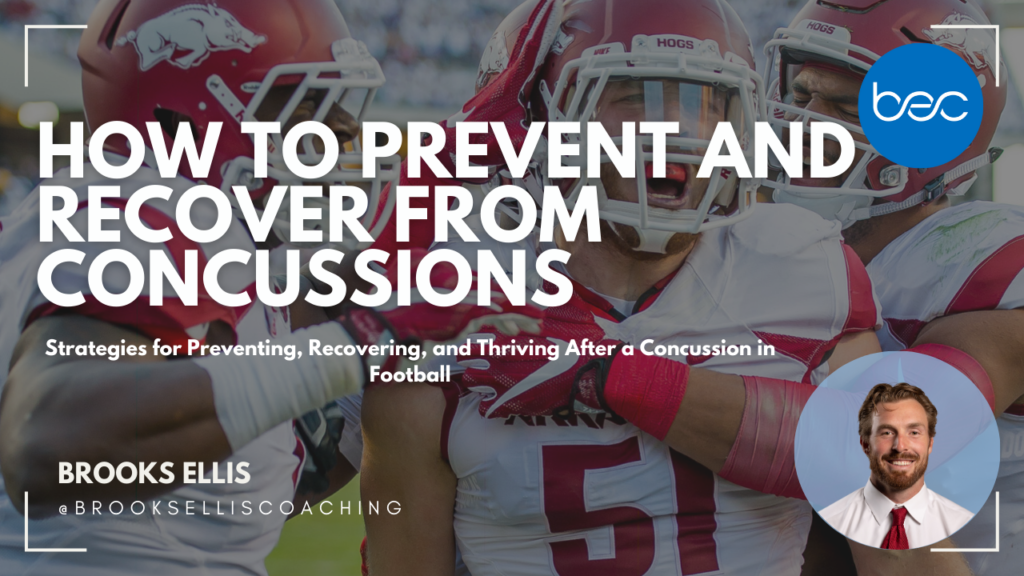Winning a big game is what we play the game for. The big crowds, the tailgates, and the excitement at school after the games make all the strain and struggle during practice worth it.
In the regular season, a big game can be the defining moment in your season. Winning could mean the start of a run that propels your team into an excellent position for the playoffs, or it could be a fluke and possibly your only victory of the year.
The great thing about football is that you never know when that big game will occur. You must maintain a vigilant eye to avoid being the team that gets upset.
This weekend did not disappoint when Vanderbilt pulled off a once-in-a-lifetime upset against #1-ranked Alabama. After a remarkable performance against Georgia the weekend before, Alabama looked like they were suffering from the big-game hangover. And let’s not forget the BIG UPSET against #4 Tennessee by the Fighting Razorbacks! Wooo Pig!!
Big games are electrifying, whether at the start of the season or to cap it off, but if you want to be truly great and leave a legacy of sustained success, you’ve got to do it more than once. In this article, I’ll share three ways to prevent complacency from creeping in so you can maintain positive momentum for the rest of the season.
1. Routine/Process
Look at any dominant football program, and you’ll see a heavy emphasis on process or routine. To win—and to win consistently—you need a process that leads you to victory. Every player, business, successful organization, and team has a process that leads to success or failure.
When I walked into the meeting room in New England, the emphasis was immediately on finding your process. If you’re not succeeding, look at the process. If your process isn’t working, fix it. Whether you’re an individual player or a coach, finding a process that cultivates success is critical to maintaining it.
You may not realize it, but you already have a process. You wake up, hopefully get some early sunlight, spend quality time with your family, and prepare your mind for the day. Or, you wake up, look at your phone, rush out the door for school or work, and get to your destination feeling some type of way. Your process determines how you perform that day.
For example, today, I woke up, prayed, walked my dog, worked out, read my Bible, and made breakfast before writing this article. This process makes me feel calm, prepared, and mentally ready to produce. I can’t control how successful what I create will be, but I can control my inputs to maximize my potential outcomes.
Finding a process that works ensures that whether you win or lose, you remain disciplined, focused, and undistracted. It keeps you moving forward despite any motivation, energy, or confidence lapses. This is where mediocre teams lose steam—they get too excited about a win and forget the bigger picture: the legacy they leave through consistent wins, not just one.
The process is everything. As a player, think about how you’re showing up to practice, school, and games, both mentally and physically. Are you focused or scattered? If you’re scattered, your process is likely off, and you’re not fully maximizing your opportunity to develop your skills and perform at a high level.
The process is a combination of two things: preparation and review. Preparing to win means caring for your body and mind through proper sleep, hydration, nutrition, and positive thinking. It also entails how you approach your practice, workouts, recovery, and pre-game preparation through film review and your pre-game routine. Review means analyzing the previous week and adjusting your process based on what worked and didn’t. This routine keeps you locked in and focused, constantly refining your process so that success occurs more frequently.
The process is everything. Find what works for you, stick to it, and watch your productivity and performance take off.
2. Every Game, Every Play Matters
During the regular season, you’re quick to identify the big games. Family and friends are making travel arrangements to come watch, and you feel the pressure from the media as everyone knows that two powerhouses are meeting up for an epic battle.
It’s natural to feel the excitement for these moments, which is obviously why they’re great. It’s a big game because there’s a lot on the line. However, putting too much pressure on one game can prevent you from experiencing the success you’ve prepared to have because you become overstimulated and step out of your optimal performance state.
Physically, you’ve been preparing for this game, and you have the process down, but mentally, psychologically, you know in the back of your mind this is the big one, fans and teammates are counting on you, scouts are coming in to watch, and you know this game is huge for playoff or bowl game selections. The process may stay the same, but you quickly get overwhelmed by the hype.
To prevent yourself from getting overhyped, your mindset must be to treat this game just like any other game. Just like during a game, in which you’re aware of some big moments, you have to maintain your eye discipline, training, and awareness in the course of the season, stick to your training, and allow the excitement to propel you into better performance through your disciplined technique instead of letting it overwhelm you.
As discussed earlier, you can’t control the outcomes, but you can control the inputs. Make sure your process is secure, and in the middle of a game, you’re locked in on doing your job and your job alone, and let the rest speak for itself. You shouldn’t even worry about who the other team is outside of knowing their tendencies, play calls and best players. It’s another day at the office. You’re going to work and must stay focused on YOUR job.
The mindset you should have after winning a game is that every game is the exact same. I often heard in our locker room, “Oh, it’s Alabama week, I’ll be in the film room a bunch this week…” I’m thinking, shouldn’t you be in the film room as much as you are for this week, every week? You should treat every game as if they’re Alabama as if they’re the most important game on your schedule because they are.
What’s the most important game? The next one.
3. Release Pride
The last strategy for overcoming complacency is to release your pride. EASIER SAID THAN DONE. Everyone on the earth experiences pride; if they say they don’t, that is a sign of their pride.
Pride tells you that you’ve made it, that you’re too good for coaching, and that you are too good to show coaches and teammates that you’re willing to do the work. I’ve seen it countless times where a client or even former teammates were so prideful that putting forth their best effort went against their being, and they couldn’t do it. They thought they didn’t have to show effort because they thought they were so much better than the other players.
I’d like to say this hasn’t happened to me, but it certainly has. After messing up a play, I remember coaches yelling at me or telling me how to shift my technique, but acting with pride, I would maintain my technique, thinking I knew better. The fact is, why would they be screaming if I wasn’t in the wrong? Are they dumb, or am I just unaware?
After proving that I was willing to put in the work, I realized that it wasn’t my work ethic or talent that was the issue; it was my unwillingness to admit that I was doing something wrong and could use some help. This issue prevented me from developing my game more quickly than I did.
If you or your team think they’re too good to practice, watch film, or prepare as you did before that game after beating a formidable opponent, you’re in for a rude awakening. We play the game because it requires facing the unknown, the fact that either team could win. Is it likely that one team would win? Yes, but crazier things have happened. I read an article today where a fan commented on the Bama v. Vandy Game, and it read, “Vandy knew they could win the game, Bama thought they should win the game. BIG difference.” Bama is a team that knows they’re good but backs it up time and time again. However, they certainly aren’t immune from pride. Pride allowed a much lesser team to beat them, something that “should’ve” never happened for Bama, but it did, which is awesome.
Your mindset to prevent pride from ruining your season is that no player is better than anyone else, and no team is better. Every great player religiously focuses on the fundamentals. Kobe, Steph, Brady, etc., all practice the fundamental skills for their position on a DAILY basis. Why should it be any different for you? In 2017, New England watched a film together, practiced open-field tackling as a team, and practiced ball handling and turnovers together. Do you think anyone else was doing that? They focused upon the fundamentals more than anyone else, and guess where that landed them, amongst one of the greatest dynasties of all time.
The very best of the best watch film. They take care of their nutrition. They double down on their recovery. And they are constantly seeking coaching to fine-tune their already high level of performance… What makes you and your team any different?
Pride will ruin your season if you let it. Instead of thinking you’re too good to prepare for the next opponent, remember your process, what made you great in the first place, and enforce it.
Final Thoughts
Anyone can win a game, but you’ll have to do it repeatedly if you want to be great and leave a legacy of excellence. To win consistently, you must focus on the process and ensure you’re disciplined with your inputs. When you have a process that works, nothing can stop you. Then, by treating every game as the most important game, you’ll not only ensure your process is maintained, but you’ll be able to focus on your technique and prevent the hype from getting in your way. And last, you’re not too good to play your next opponent, and you’re not too good to avoid the fundamentals. You must be hypervigilant to prevent pride from creeping into your process from working.
These three critical things, when instilled, can be the difference in a one-and-done performance or an All-American, All-SEC type season.







